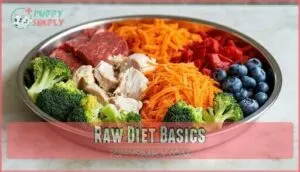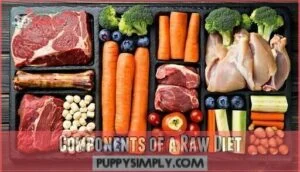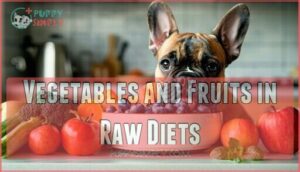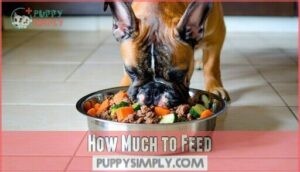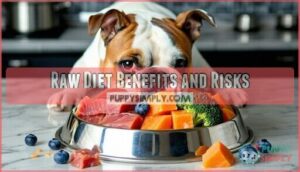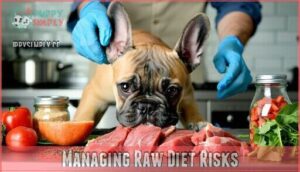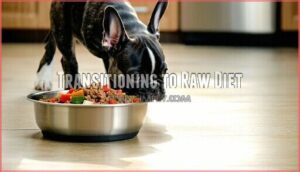This site is supported by our readers. We may earn a commission, at no cost to you, if you purchase through links.
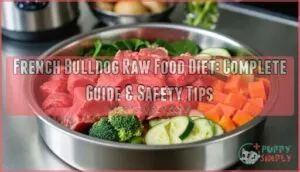
Raw feeding can put a spring in your pup’s step, help that coat shimmer, and keep those tail-wag greetings coming.
But there’s no magic in skipping kibble—you’ve got to balance meat, organ, and veggie portions, keep everything squeaky clean, and check with your vet so you’re not barking up the wrong tree.
Handle raw foods with care, or you might get a side order of germs.
Curious which mistakes even seasoned owners make with raw food? We’ll tackle those next.
Table Of Contents
- Key Takeaways
- Raw Diet Basics
- French Bulldog Nutrition
- Creating Balanced Raw Diet
- Feeding French Bulldogs Raw
- Raw Diet Benefits and Risks
- Managing Raw Diet Risks
- Transitioning to Raw Diet
- Frequently Asked Questions (FAQs)
- Can French Bulldogs eat raw food?
- What should a French Bulldog eat?
- Can French Bulldogs eat vegetables?
- How much protein should a French Bulldog eat?
- Can French Bulldogs eat fish?
- How much should a French Bulldog eat a day?
- Is a raw diet good for French bulldogs?
- How much raw food should a Frenchie eat?
- What is the best diet for a French Bulldog?
- Why do vets say not to feed raw?
- Conclusion
Key Takeaways
- Make sure to balance meat, organs, vegetables, and supplements in each meal—just tossing meat in a bowl isn’t enough.
- Practice strict hygiene and safe handling of raw food to protect both your dog and your household from bacteria.
- Keep a close eye on your Frenchie’s health and adjust the diet as needed; consult your vet to prevent nutritional gaps.
- Feeding the right portion, typically 2–3% of your dog’s body weight, is key to maintaining a healthy weight and energy level.
Raw Diet Basics
If you’re thinking about switching your French Bulldog to a raw food diet, you’ll need to understand the basics before making any changes.
Raw feeding means offering fresh meats, organs, and safe produce, but it’s not as simple as tossing your pup a steak from the fridge, which involves understanding the concept of complete concepts.
What is Raw Feeding
Raw feeding for French Bulldogs means serving up meals close to nature—think Diet Definition meets Ancestral Eating, not a fast-food stop.
You’ll use fresh Raw Components and follow the BARF Meaning (“Biologically Appropriate Raw Food”).
A raw food diet usually includes:
- Meat and edible bones
- Organs
- Fruits and veggies
- Sometimes, a dash of dairy or supplements, which can be part of a raw food diet.
Benefits of Raw Diets
When you switch to a raw food diet for your French Bulldog, you might spot benefits like shinier coat quality, fresher breath, and firmer stools.
A raw diet can give your Frenchie a radiant coat, fresher breath, and those perfect, firm stools every owner notices.
Raw feeding often means fewer additives, which can bring allergy relief and better digestion improvement.
Some folks see an energy boost, and regular chewing supports dental health.
It’s not magic, but small, real health benefits matter.
Risks of Raw Diets
With raw diets, you might face more than just messy countertops.
Bacterial contamination and nutritional imbalance are serious issues—think Salmonella, not just an upset tummy.
Bone hazards can cause choking or blockages faster than you’d expect.
There’s even zoonotic risk, meaning germs can jump from bowl to human.
The FDA concerns are real: treat raw diet risks with caution.
French Bulldog Nutrition
Your French Bulldog needs the right mix of proteins, fats, vitamins, and minerals to stay healthy and energetic.
If only they came with a nutrition label, planning meals would be a walk in the park.
Essential Nutrients for French Bulldogs
Think of your French Bulldog’s bowl as a tiny science lab.
To meet bulldog nutrition needs, you’ll want balanced protein sources, sensible fat intake, and careful mineral balance.
Don’t skip vitamins—dog nutrition hinges on them.
Hydration importance can’t be understated; always keep water fresh.
Meeting these nutritional needs helps prevent costly vet visits and keeps your pup wagging with careful mineral balance and sensible fat intake.
Role of Meat in Raw Diets
With French Bulldogs, protein is your top priority—aim for meat making up 60–75% of their meal, with muscle meat as the main protein source.
A well-balanced raw meat diet means watching Meat Percentage and Bone Content, since too much or too little can throw things off.
Think lean beef, chicken, or lamb for ideal protein and happy energy.
Importance of Organ Meat
After exploring muscle meats, let’s talk organ meat.
In the context of raw meat diet variety, these “nature’s multivitamin” cuts deliver concentrated Nutrient Density your bulldog can’t get from muscle alone.
Liver benefits include vitamins, kidney function boosts detox, and yes, spleen’s role is iron-rich.
Mixing up dog food ingredients makes certain your raw diet organ meat hits every nutritional mark.
Experts like Dr. Becker advocate for higher organ inclusion.
Creating Balanced Raw Diet
Building a balanced raw diet for your French Bulldog takes more than tossing some chicken in their bowl—it means hitting all the right nutrients, every meal.
You’ll need to pay close attention to protein, healthy fats, vegetables, and the occasional organ meat, or you might wind up with a dog who’s craving more than just treats, due to missing out on essential nutrients.
Components of a Raw Diet
Balanced feeding gets easier when you know what goes in the bowl.
Aim for 70% raw diet meat and raw diet bones, with 10% for raw diet organ meat—think liver, kidney, and the odd heart.
Mix in raw diet vegetables and grain inclusion for fiber.
Fruit supplements and raw diet supplements round out vitamin needs.
Organ variety keeps meals interesting and nutritious.
A vet should be consulted before starting a raw diet to minimize potential DCM risks, especially considering potential health impacts and the importance of a well-planned diet.
Vegetables and Fruits in Raw Diets
Raw diet vegetables and raw diet fruits bring valuable variety to your dog’s bowl.
Toss in safe produce like carrots or blueberries—just skip grapes and onions.
The fiber content helps keep those stools firm, while vegetable benefits include vitamins and antioxidants.
Proper preparation, such as steaming dog veggies, enhances digestibility and nutrient absorption.
Small pieces and portion control matter, especially for flat-nosed pups, and your dog food recipes should rotate fruits and vegetables smartly.
Grains and Supplements
Veggies add color, but grains and supplements add balance to your Frenchie’s plate.
Grain inclusion helps avoid energy slumps and upset tummies, while the right supplement types protect against deficiencies.
Keep these in mind:
- Grain-free isn’t risk-free—think vitamin sources and mineral balance.
- Dog vitamins and minerals support raw diet dog nutrition.
- Overdoing supplements? Not fun for anyone, as it can lead to energy slumps and upset tummies due to an imbalance in vitamin sources.
Feeding French Bulldogs Raw
Feeding your French Bulldog a raw diet takes careful planning to make sure every meal meets their nutritional needs.
You’ll want to watch for portion sizes, balance, and the occasional look your dog gives you when you forget the chicken.
How Much to Feed
Figuring out the right raw diet portion size can feel like guessing the weather.
Most adult French Bulldogs thrive on 2–3% of their ideal weight daily.
Always use a raw food calculator, double-check portions with feeding charts, and watch your pup’s waistline.
Calorie calculation, portioning strategies, and regular weight monitoring keep feeding safe, smart, and precise.
| Weight (lbs) | Daily Raw (lbs) | Calorie Range |
|---|---|---|
| 16 | 0.32–0.48 | 260–350 |
| 20 | 0.40–0.60 | 320–430 |
| 25 | 0.50–0.75 | 400–550 |
| 30 | 0.60–0.90 | 480–650 |
| 35 | 0.70–1.05 | 560–750 |
Feeding Puppies Vs Adults
After figuring out raw diet portion size, you’ll see that puppies and adults play by totally different rules.
Puppies burn through calories fast, so their raw diet needs more protein and higher calories for proper growth and bone density support.
Adult portion sizes drop as energy level differences surface.
Remember, puppies need extra calcium—think “building blocks”—while adults just maintain.
Monitoring Health and Adjusting Diet
Every few weeks, do a checkup on your dog’s health—raw diets mean you’ll want to watch for subtle changes.
Here’s your three-step routine:
- Monitor stool consistency and energy levels for signs of gastrointestinal issues.
- Weigh your dog and check coat condition for weight changes or allergy symptoms.
- Schedule regular vet consultation to adjust diet as needed.
This routine is crucial for maintaining your dog’s overall health, especially since regular vet consultation can help identify potential issues early on.
Raw Diet Benefits and Risks
You might notice your French Bulldog’s coat looking shinier or their energy improving with a raw diet, but there’s also the real chance of nutritional gaps or bacteria sneaking into the bowl.
Before you start prepping meals like a doggy chef, it’s smart to know both the upsides and the risks.
Improved Health and Energy
Switching up how much and what you feed your French Bulldog often raises questions about energy and overall dog health.
When you stick to a raw diet, you’ll likely spot brighter Coat Shine, better Digestion Quality, and more bounce in their step.
Many owners see stronger Muscle Strength, steadier Weight Management, and reliable raw diet health benefits—pure canine nutrition at work.
Reduced Allergies and Skin Issues
Imagine your French Bulldog’s itchy skin vanishing like socks in the dryer.
A raw diet can mean fewer dog allergies, reduced inflammation, and less scratching.
Fresh ingredients support Allergy Elimination, boost Skin Hydration, and promote Coat Improvement.
A raw diet may also provide bioavailable nutrients for healthier skin.
While not a magic fix, many owners see fewer raw diet allergies, better itch reduction, and healthier skin—even if the occasional belly rub is still needed.
Potential for Nutritional Deficiencies
With raw diets, you’ve got to watch for mineral imbalances and vitamin deficiencies—especially if you’re winging it with homemade meals.
Even the healthiest-looking bowl can hide a vitamin gap—watch those minerals when mixing up homemade meals.
Even commercial options can come with shortcomings. An unbalanced diet may lead to long-term effects like malnutrition, weak bones, and skin issues.
Regular checkups help catch nutritional imbalances in minerals and vitamins, keeping your Frenchie feeling exceptional.
Managing Raw Diet Risks
Keeping your French Bulldog safe on a raw diet means staying alert to the risks, from bacteria to unbalanced meals.
You don’t need a lab coat—just a little know-how and a lot of hand-washing can go a long way.
Safe Handling and Storage
In the context of safe food handling, don’t cut corners—dog food safety is no joke, even if your bulldog begs otherwise.
For preventing contamination, stick to these steps:
- Store raw diet ingredients in the fridge, never at room temp.
- Practice safe thawing—overnight in the fridge only.
- Scrub bowls daily for bowl hygiene.
- Handle bones carefully—never cooked!
To prevent bacterial infections, consider raw food safety.
Reducing Bacterial Contamination
Chicken thighs, fresh gloves, and a good freezer are your best friends against dog food contamination.
Always wash hands, sanitize surfaces, and freeze meat to help knock down bacterial contamination and pathogens.
Safe Handling, Food Sourcing, and Bowl Hygiene make a difference.
One can easily find raw options for canine diets.
| Safe Handling | Freezing Benefits | Bowl Hygiene |
|---|---|---|
| Gloves, handwash | Slows bacteria spread | Daily soap, hot water |
| Separate cutting | Kills some pathogens | Clean after each meal |
| Container storage | Extends shelf life | Avoid cross-contamination |
Consulting With a Veterinarian
On the path to a safe raw diet, make vet expertise your first stop.
A veterinary consultation brings health monitoring, breed specificity, and personalized supplement advice all under one roof.
Even the best Google search can’t match a raw diet vet consultation when customizing diets.
Regular vet visits let you catch small issues before they snowball into real problems.
Transitioning to Raw Diet
Switching your French Bulldog to a raw diet takes patience and careful observation, as even the bravest pups can raise an eyebrow at new food.
Keep a close eye on any changes in their digestion or energy level—your dog’s idea of “taste testing” might differ from yours, requiring observation to understand their needs.
Monitoring for Dietary Changes
So, after you’ve learned about safe raw food handling, here’s what comes next: keep an eye on Stool Consistency, Weight Fluctuations, Energy Levels, Coat Condition, and Appetite Changes.
Different dog breeds may react differently, and dog health issues can pop up fast.
Observing stool form variations can provide insights into your dog’s digestive health.
When in doubt, a quick call or visit to your vet makes all the difference.
Adjusting Portion Sizes and Ingredients
After watching for changes in your French Bulldog’s health, it’s time to refine the meal plan.
Use these pointers to keep the raw diet on track:
- Adjust calories as activity levels shift.
- Rotate ingredients for balance.
- Use puppy portions for growing bones.
- Make senior adjustments for older pals.
A balanced diet should have a 1:1 calcium ratio for ideal health, and it’s crucial to mind nutritional requirements—every dog breed is unique, with balanced diet needs.
Frequently Asked Questions (FAQs)
Can French Bulldogs eat raw food?
Yes, French Bulldogs can eat raw food if you’re careful about balance and hygiene.
Always consult your vet first, since going raw isn’t one-size-fits-all—just like not every dog loves fetching the mail.
What should a French Bulldog eat?
Your French Bulldog needs a balanced mix of lean meats, fresh veggies, some fruit, and grains unless allergic.
Always serve food in safe portions—think more “gourmet chef” and less “all-you-can-eat buffet” for healthy living, considering the importance of balanced meals.
Can French Bulldogs eat vegetables?
Picture your bulldog as a curious rabbit nibbling in a garden.
You can safely feed them veggies like carrots, green beans, or pumpkin.
Just chop them, avoid onions, and check for any stomach upset—some dogs love variety, others don’t, and it’s crucial to monitor their reaction to new veggies.
How much protein should a French Bulldog eat?
Aim for at least 18% protein in your French Bulldog’s daily intake—think of it as building blocks for those wiggly muscles.
Puppies, growing fast, need even more, but don’t skimp, and don’t go overboard either.
Can French Bulldogs eat fish?
Roughly 20% of raw pet food in the UK contains Salmonella—fish included—so you’ll want to pick fresh, deboned options.
Stick to safe choices like salmon or sardines, and always check for bones!
How much should a French Bulldog eat a day?
Your bulldog should get about 25 to 30 calories per pound of body weight each day, split into two meals.
Watch their waistline—bulldogs love to eat but hate exercise, so don’t let chubby sneak up!
Is a raw diet good for French bulldogs?
Curiosity killed the cat, but luckily, you’ve got a Frenchie.
Raw diets can spark shinier coats and better energy, but there’s real risk for bacteria and unbalanced meals—talk with your vet before serving up anything wild.
How much raw food should a Frenchie eat?
Feed your Frenchie about 2–3% of their body weight in raw food daily, split into two meals.
Monitor their waistline—they should look athletic, not pudgy.
When in doubt, check with your vet or trusted pro.
What is the best diet for a French Bulldog?
Imagine your Frenchie as a little soldier from the nutrition wars: you’ll want a balanced diet with high-quality protein, moderate fat, some veggies, and essential vitamins.
Always check with your vet for personal advice—they know your dog’s needs best.
Why do vets say not to feed raw?
Vets worry about raw diets because bacteria like Salmonella can sneak in, posing risks to your dog and your family.
Plus, it’s tough to balance all the nutrients.
Safety and science say cooked food is safer.
Conclusion
Smart choices support a successful switch to a french bulldog raw food diet.
You’ll want to balance those proteins, keep veggies varied, and remember organ meat’s key role.
Wash up well—no one wants a side dish of germs.
Daily monitoring makes sure your pup’s tail keeps wagging, and don’t skip those vet visits; it helps avoid nutritional no-nos.
Done right, your frenchie can thrive, enjoy shiny coats, and greet you with even more enthusiasm at the end of each day.
- https://wefeedraw.com/blog/organ-meat-for-dogs
- https://petwell.com.au/blogs/posts/organ-meats-for-dogs-and-cats
- https://aplaceforpaws.com/blogs/news/rethinking-organ-meats-a-fresh-look-at-feeding-organs-in-a-raw-diet-for-dogs
- https://elevatepet.com/blogs/news/organ-meat-for-dogs-why-it-s-beneficial-and-how-to-feed-it-safely
- https://www.dogster.com/dog-nutrition/organ-meat-for-dogs

